Henrique Mukanda on the Semiotics of African Talent Visibility
Making African Talent Legible to Global Markets
Welcome to Issue #21 of TAIS, where every Friday we spotlight visionary changemakers reshaping Africa’s tech, data, and AI landscape, one breakthrough at a time.
In today’s issue, we spotlight Henrique Mukanda, a Congolese entrepreneur and the Co-founder & Deputy CEO of Itot Africa and Okademy. These organizations focus on digital training, employment, and talent development across Africa.
Since 2017, Henrique has been leading Itot Africa with a mission to create and bring jobs back to the continent through digital skills development. The company trains African talent while helping local and international businesses recruit top tech professionals and upskill their existing workforce.
Itot Africa offers digital training at basic, intermediate, and advanced levels, aiming to become the first African startup to deliver education through a hybrid model, combining online learning with in-person instruction at training centers across the continent.
Origin Story & Vision
Q: How did unemployment post-studies spark the creation of Itot Africa, and what inspired your vision for digital skills as a driver for job creation across Africa?
A: When I finished my studies, I went through what many young Africans experience: the endless wait for that “call” that never comes. CVs sent, no replies. Between frustration and self-doubt, I realized the problem wasn’t just me, it was the system: an oversaturated job market, companies looking for skills that our academic training didn’t always provide, and an economy moving faster than our university programs.
It was when I helped, almost by accident, a friend to create an online CV and use LinkedIn that I saw enormous potential. That friend landed a freelance job in just a few weeks. I thought, “What if we could multiply that effect?” I began training young people around me in digital tools, and the results repeated themselves. Some started their own businesses, others landed international gigs.
That’s where the vision for Itot Africa was born: to make digital skills not just a sector, but a lever for economic transformation across Africa. The idea was simple: if we can’t create enough physical jobs locally, let’s build the bridges to global opportunities through digital work.
Q: Reflecting on your entrepreneur journey, what’s one surprising failure or pivot that offered a critical lesson in building a mission-driven EdTech venture?
A: One of the biggest mistakes we made in the beginning was believing that we had to do everything ourselves. We thought, “If we delegate, it won't be done properly.” As a result, we spent our days coding, training, managing finances, prospecting for clients... all while trying to maintain a strategic vision. We quickly realized that we were building a business... but on a single pillar: ourselves.
The problem is that a single pillar eventually cracks under the weight. By trying to carry everything ourselves, we nearly burned out and slowed the company's growth. The lesson was clear: you don't build an impact project alone, you build it with a team.
Today, we see delegation as an investment, not a loss of control. By entrusting certain tasks to competent people, we not only freed up time to focus on the vision, but also discovered that others could contribute ideas and skills that we didn't have.
Editorial commentary: Henrique’s “accidental” discovery through his friend’s LinkedIn success exposes a core misdiagnosis in development economics. The prevailing narrative treats African unemployment as a skills deficit, solvable through capacity building. But Henrique stumbled onto a golden nugget of truth : African talent is often invisible to global capital flows. His friend already had marketable skills; what he lacked was the semiotic infrastructure (the systems of language, platforms, and presentation) that make skills legible to international markets.
This reveals a massive value gap that traditional development thinking largely misses. Instead of building new capabilities, the real challenge is translation and visibility, converting existing human capital into globally recognizable formats. Henrique’s vision for Itot Africa is less about education in the narrow sense, and more about building an economic “visibility infrastructure” that allows African competence to be properly valued and integrated into global systems.
In this light, much of what we call “capacity building” in Africa is also “visibility building”; not necessarily teaching people new skills, but teaching them new ways to signal existing and emerging ones. The deeper implication is unsettling. Much of the foreign aid and development finance system rests on deficit assumptions, when in reality the barrier may be invisibility. And invisibility can be just as economically costly as an actual lack of skills.
Impact & Transformation
Q: Beyond the numbers, what real-world transformations, such as career changes or community shifts, have you observed among Itot Africa’s trainees?
A: Numbers are important, but they don’t capture the warmth of a smile or the pride of a family. Among the stories that have touched me most is that of Rachel Molo, a young woman from Goma. Before joining our program, she ran a small cleaning business that only operated locally in Goma. Through our 150 Women Micro-Entrepreneurs training program which equipped women with skills in digital tools, social media communication, and online marketing Rachel learned how to expand her reach far beyond her city.
Today, she manages a cleaning company operating in multiple provinces of the country, attracting clients she never thought she could reach before. This transformation didn’t just grow her business; it created jobs and inspired other women in her network to think bigger.
These kinds of success stories create ripple effects: small local businesses adopting digital tools, women traders selling through WhatsApp and Instagram, and even schools daring to integrate AI into their teaching. It’s a virtuous cycle each trained person becomes a catalyst for those around them.
Q: How do your ventures in agriculture, livestock, and aquaculture complement or inform your digital training work? Are there cross-learning moments between these sectors?
A: At first glance, agriculture and digital seem far apart. But in reality, they share a fundamental principle: patience and planning. In the fields, you plant, you nurture, and you wait for the harvest. In digital, you train, you mentor, and you wait for skills to bear fruit.
These agricultural activities help me keep a long-term vision and accept that not everything produces immediate results. And conversely, my digital expertise helps optimize my agricultural operations inventory tracking, online marketing, logistics management.
Editorial commentary: Rachel Molo’s transformation is proof that “spatial mismatch” can be corrected at unprecedented speed. In economic terms, that’s when people’s skills and opportunities are located far apart. Traditional development theory assumes that expanding market reach takes decades of investment in infrastructure, supply chains, and institutional capacity.
Rachel’s story shows otherwise. With the right digital tools, geographical economic barriers can collapse almost instantly. She didn’t need new roads, banks, or regulatory frameworks only the momentum of network effects, where each new connection increased value for everyone involved. Her success suggests that African businesses may be able to skip entire stages of economic development that other regions had to build step by step.
The ripple effects Henrique describes are nothing less than disruptions to economic geography. When local businesses suddenly reach non-local customers, it changes the economic logic of place. That could produce a very different African urbanization pattern from Asia or Latin America’s history: instead of massive migration to economic centers, we might see prosperity distributed across small towns and rural areas, with people participating in global markets from their own communities.
Training Philosophy & Methodology
Q: When developing training programs, how do you strike a balance between global digital standards and the unique linguistic, cultural, and infrastructural realities of Francophone Sub-Saharan Africa?
A: The challenge is staying aligned with global standards while speaking the learners’ language literally and figuratively. We maintain international technical standards but translate and contextualize them.
For example, in our e-commerce modules, we don’t just talk about Amazon or Shopify; we show how to digitize a shop in Lubumbashi’s market. Linguistically, our content is in clear French, enriched with local examples and illustrations. On the technical side, we design “data-light” courses so they can be accessed even with entry-level smartphones and unstable connections.
It’s not just about technology it’s about respect: respecting learners’ realities, pace, and context.
Q: You aim to be the leading on-demand digital training platform in your region. What strategic choices help you scale access without sacrificing mentorship or meaningful support?
A: The temptation with digital platforms is to automate everything. But in learning, the human touch remains irreplaceable. We’ve chosen a hybrid model: an online platform for 24/7 content access, complemented by local mentors for personalized support.
Every learner has access to coaching sessions, group workshops via videoconference, and, whenever possible, in-person meetups through our partners. This way, we grow in numbers without losing human connection.
We also invest in training trainers: by multiplying our mentors, we can support more learners without diluting quality.
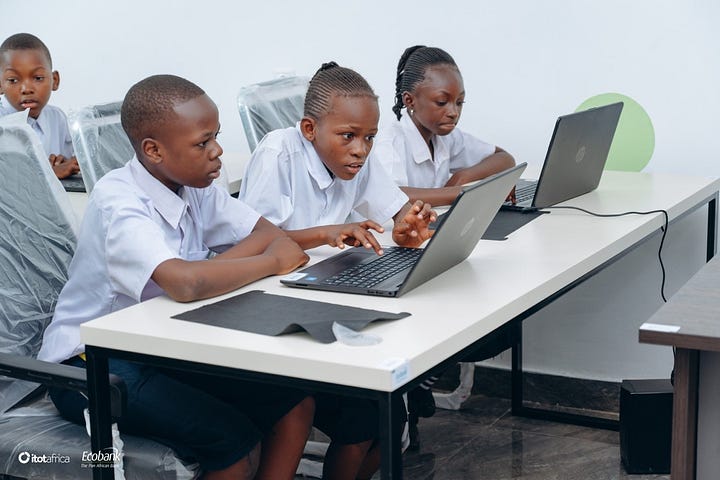
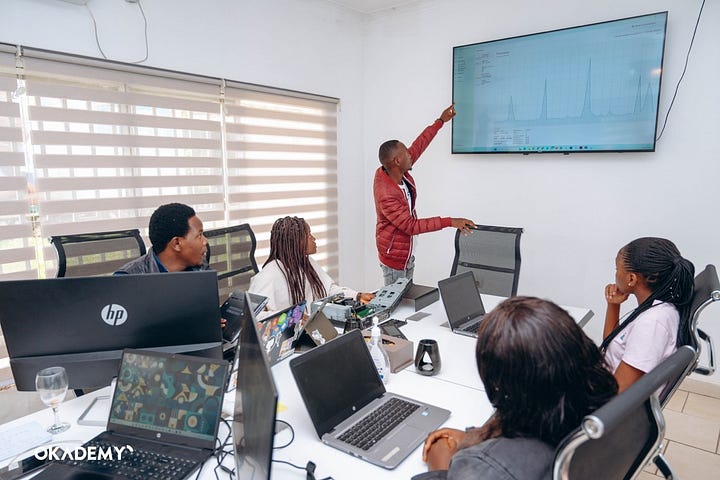
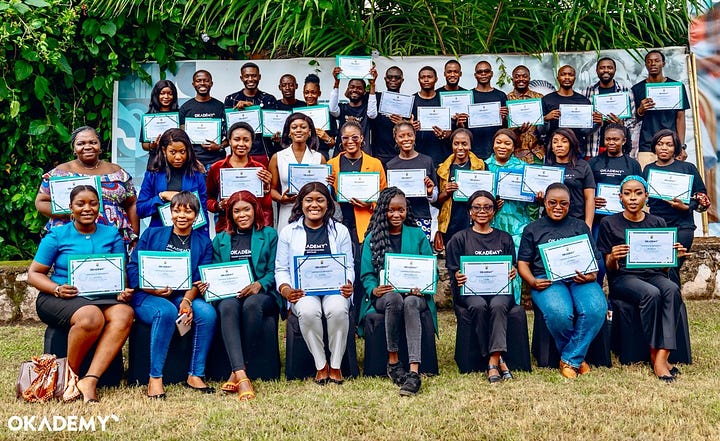
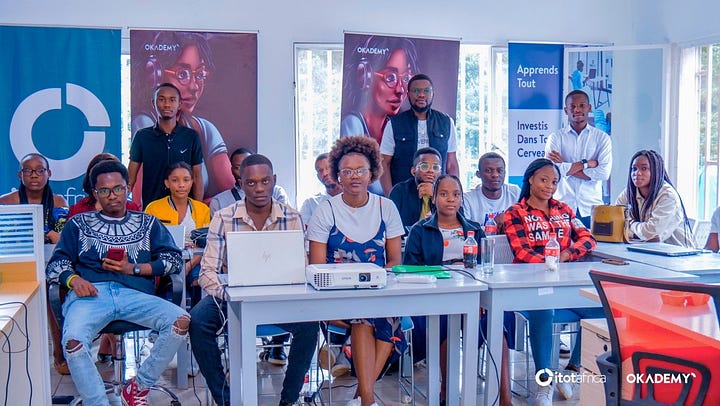
Q: With your dual role as both educator and operator, what insights from academia most influence how you structure and deliver your online trainings, especially in terms of learner motivation and outcomes?
A: As an educator, I’ve learned that motivation is fueled not only by passion but by small victories. That’s why our training programs are broken down into short modules, each with a concrete, achievable goal.
From the very first week, learners complete a simple yet rewarding project creating a professional page, configuring a tool, selling a test product. These small wins build confidence and encourage them to go further.
We also focus heavily on project-based learning: people learn best by doing, not just by listening.
Q: With your background in cybersecurity, how do you weave digital safety and trust into your training ethos, especially as more learners engage in remote work online?
A: For many, cybersecurity feels abstract until the day an account is hacked. In our trainings, we start by making it tangible: creating strong passwords, spotting phishing emails, protecting files.
We also teach best practices for remote work: vetting clients, securing payments, safeguarding data. Trust is the currency of the digital economy without it, there’s no market.
Editorial commentary: While Silicon Valley optimizes for unlimited bandwidth, storage, and processing power, Itot Africa is pioneering solutions that deliver maximum value with minimal resource consumption. At first glance, it might seem like Henrique is simply finding ways to “make things work” in Africa’s constrained environments. In reality, he’s developing technological approaches that could prove more relevant globally as resource constraints tighten. Designing courses for entry-level smartphones and unstable connections can look like a compromise until one realises it’s actually innovation toward universal accessibility, a goal most global EdTech companies have yet to even imagine.
The deeper insight is the innovation philosophy behind this work.
Silicon Valley’s trajectory tends to be additive: more features, higher performance, greater resource demands.
African entrepreneurs like Henrique innovate by subtraction: removing dependencies on expensive devices, constant connectivity, or abundant electricity. They create solutions that work with less, for more people, in more contexts.
As sustainability and inclusion move from afterthoughts to primary global imperatives, this “less is more” approach could become a source of global competitive advantage.
Scaling & Challenges
Q: As you’ve already generated dozens of digital jobs, what are the biggest hurdles to scaling sustainable, quality digital employment across the DRC or Francophone Africa?
A: Three major challenges stand in the way :
First, the language barrier: while we have introduced some bilingual content, not all of our training programs are bilingual yet. English remains extremely important for accessing the largest share of global opportunities, and learners who don’t master it often find themselves limited to local or regional markets.
Second, infrastructure: the arrival of Starlink in the DRC is a game-changer for connectivity, but it’s not yet a solution for everyone. You need the means to acquire and maintain it, which puts it out of reach for many aspiring digital workers. In rural or low-income areas, unstable connections still remain a major obstacle.
Finally, there is the lack of strong professional networks: many talented individuals work in isolation, with little visibility or access to clients. Without communities, mentorship, and exposure, it’s harder to sustain digital careers over time.
We are addressing these challenges step by step encouraging English learning as part of career growth, working with partners to improve connectivity access, and building local freelance communities so talent doesn’t remain hidden.
Q: You mentioned initial skepticism toward local digital providers. How have you and how should the broader ecosystem, overcome these trust barriers toward African talent?
A: The only real antidote to skepticism is proof. We deliver, we document, we share our successes. Each completed project, each satisfied client becomes an argument for African quality.
Beyond individual action, the ecosystem must stand together: showcasing our talent, avoiding self-devaluation, and building collective showcases for our successes.
Editorial commentary: In international development, there’s a common assumption about linguistic economic sovereignty: that English proficiency is simply a skills gap to be closed. Henrique’s more nuanced analysis shows this view misses deeper complexities. Francophone Africa may be developing a parallel digital economy with its own characteristics, constraints, and opportunities. This is less about language in isolation and more about economic path dependency, where existing markets and infrastructures shape future possibilities.
If Francophone African digital workers primarily serve French-speaking markets, they may develop distinct specializations, work cultures, and value propositions compared to their Anglophone counterparts. The result could be economic diversification rather than homogenization, producing multiple hubs of African digital competence rather than a single, uniform model.
The Starlink example he raised illustrates this. African digital development is not only about access but also about economic stratification. High-quality connectivity becomes a competitive advantage, potentially creating new layers of digital inequality within Africa itself. Henrique’s perspective suggests that African tech platforms will need to focus on inclusive scaling (ensuring growth reaches diverse users) rather than scaling for its own sake.
Partnerships & Collaboration
Q: Tell us about the COVID-19 solution you created with the Congolese government. How did that experience shape your understanding of public-private collaboration and innovation policy in the region?
A: In 2020, as the world came to a standstill, we were approached by the Ministry of Health to set up a digital platform for COVID-19 case tracking and large-scale awareness campaigns. Working in this urgent context was an intense lesson: administrations operate with heavy procedures, tech moves in fast cycles and you have to marry the two.
This collaboration taught me that it’s not enough to have a good idea; you must integrate it into an institutional framework, explain it, reassure stakeholders, and persuade them all while moving quickly. That balance is the key to successful public-private partnerships.
Editorial commentary: Most talk about African governance focuses on weak capacity or inefficiency. But Henrique’s experience shows the possibilities that lays within African public–private partnerships and how they enclose unique strengths.
Combining startup speed with institutional legitimacy is more about fitting solutions to the context than it is about governments being “less bureaucratic.” In a crisis like COVID-19, entrepreneurial agility plus public authority can deliver faster, more credible responses than either the private sector or government could alone.
This suggests African institutional setups, often seen as temporary or flawed, might actually be well adapted to environments where speed and trust must work together. They’re not just on the way to a Western model, they could be a different model entirely.
Future Vision
Q: Looking ahead, how would you define Africa’s strongest value proposition in the global digital economy and how can platforms like Itot Africa ensure African voices and perspectives shape the future of online work and learning?
A: Africa has three major strengths: raw creativity, the ability to innovate with limited resources, and a youth hungry to learn. In a fast-changing world, that agility is invaluable.
If platforms like Itot Africa can channel this energy, structure it, and connect it to global markets, Africa will not only be a consumer of technology but an influential producer. This requires training, integration into international networks, and confidence in our own capabilities.
Editorial commentary: Africa’s “ability to innovate with limited resources”, Henrique’s pointing to, could become a core competitive advantage in 21st-century economics. Global markets have long assumed that innovation needs abundant resources, big R&D budgets, advanced infrastructure, and deep capital pools.
But as resources tighten and sustainability becomes essential, Africa’s constraint-driven innovation could outshine abundance-driven models. The kind of innovation we rarely celebrate: the kind born from lack. The kind that emerges when systems are broken, resources are minimal, and formal structures don’t exist. Entrepreneurs who have always created maximum value from minimal inputs are, in effect, already adapted to a future where growth is limited by resources.
Closing remarks: Henrique’s observations are another confirmation that African innovation thrives not by following conventional paths, but by rethinking them. From collapsing geographical barriers to making talent visible to global markets, and innovating under resource constraints, Henrique shows that African entrepreneurs and institutions are rewriting the rules of value creation. What might appear as improvisation or adaptation is often a deliberate philosophy prioritizing accessibility, sustainability, and contextual optimization that could offer globally relevant models for innovation, governance, and economic participation.
Thank you for reading!
Join the mission
This newsletter is independently researched, community-rooted, and crafted with care. Its mission is to break down walls of complexity and exclusion in tech, AI, and data to build bridges that amplify African innovation for global audiences.
It highlights how these solutions serve the communities where they're developed, while offering insights for innovators around the world.
If this mission resonates with you, here are ways to help sustain this work:
📩Become a partner or sponsor of future issues → reambaya@outlook.com
→ 🎁Every child deserves to be data literate. Grab a copy of my daughter's data literacy children's book, created with care to spark curiosity and critical thinking in young minds. (Click the image below to get your copy!)
You can also sponsor a copy for a child who needs it most or nominate a recipient to receive their copy. Click here to nominate or sponsor.
→ 🧃Fuel the next story with a one-time contribution. Click the image below to buy me a coffee (though I'd prefer a cup of hot chocolate!)
These stories won't tell themselves, and mainstream tech media isn't rushing to cover them. Help ensure these voices reach the audience they deserve.
Let’s signal what matters together.
Thank you for being part of this journey!


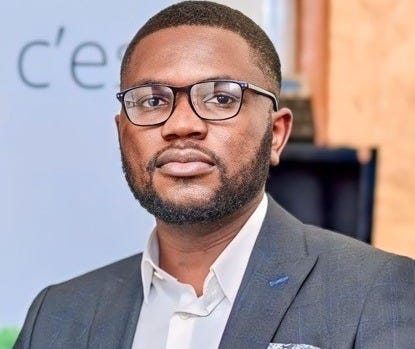

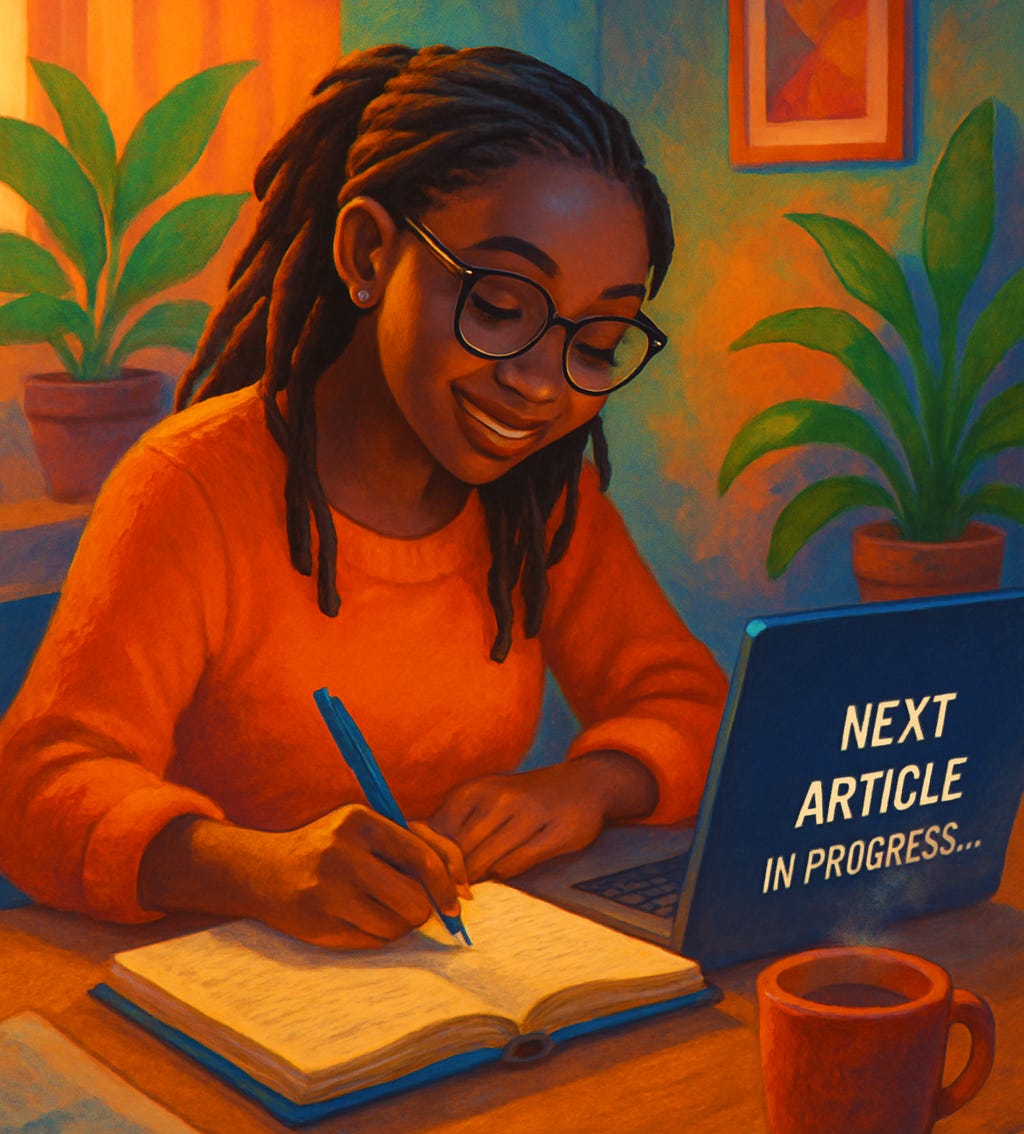
Another outstanding interview, Rebecca!
It’s inspiring how Mr. Mukanda turned his own challenge of finding employment into a mission to help so many others build their digital skills.
You’re absolutely right about the importance of the human element in training—it can’t be emphasized enough. And with the right digital skills, people can break down real economic barriers.
On the language front, tools like Apple Intelligence may soon change the game. Imagine two people, each with an earpiece, holding a conversation in their own languages in real time. Once that becomes mainstream, it could remove a major barrier to commerce.
I also appreciate the theme you highlight about making the most of the resources you have—that can truly be a strength. Anything with a human touch can add unique value. Take electric guitar amplifiers: a Fender tube amp built on a robotic line might cost $1,000, but the hand-wired version of the same model sells for nearly double. For those who can afford it, the human craftsmanship makes all the difference.
The work Mr. Mukanda is doing not only empowers people to improve their digital skills, but also serves as an inspiration for others who want to lead and innovate as he has.
Thank you very much for the article and for highlighting our work at Itot Africa and Okademy. I really appreciate how you captured our vision around making African talent visible.
It was a pleasure to share our journey with you.